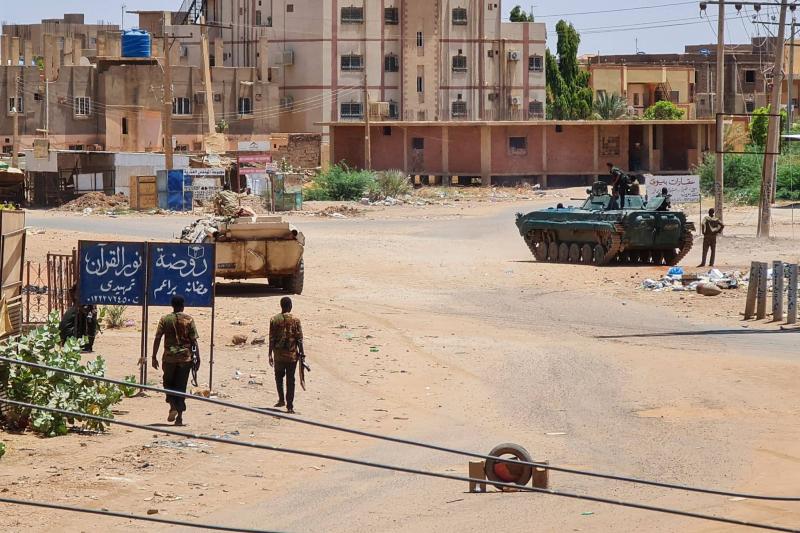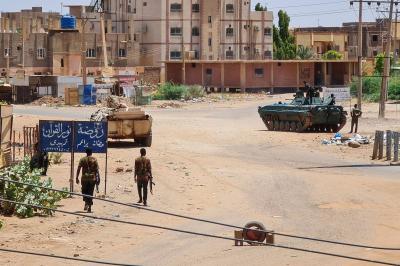The Sudanese Rapid Support Forces announced that they seized a police camp on Sunday while striving for an advantage in their conflict with the army amidst fierce fighting in the capital, Khartoum. The Rapid Support Forces stated in a press release that they fully took control of a camp belonging to the Central Reserve Police in southern Khartoum, and released footage of their fighters inside the facility, some of whom were seen removing ammunition boxes from one of the storages. They later mentioned they had confiscated 160 fully equipped vehicles, 75 armored personnel carriers, and 27 tanks.
Heavy fighting has erupted in Khartoum, Bahri, and Omdurman, the three cities that form the Greater Khartoum area, since Saturday night as the conflict between the Sudanese army and the Rapid Support Forces entered its eleventh week. Witnesses also reported a sharp increase in violence over the past few days in Nyala, the largest city in the Darfur region in the west of the country. The United Nations has raised concerns over ethnic targeting and the killing of members of the Massalit community in Geneina, West Darfur.
The capital, Khartoum, and the city of Geneina have been the most affected by the conflict that erupted on April 15 between the Sudanese army and the Rapid Support Forces, but tensions and clashes have escalated last week in other parts of Darfur and in Kordofan in the south. Residents have reported an increase in airstrikes and shelling.
Hostilities have intensified since both sides violated a series of ceasefire agreements reached in Jeddah following talks led by the United States and Saudi Arabia. Negotiations were postponed last week. The army has been deploying Central Reserve Police forces for field operations for weeks. These forces had previously been used for operations in various areas and to confront protesters opposing the 2021 coup. The United States imposed sanctions on the Sudanese Central Reserve Police last year for using excessive force against protesters.
The sentiments of Sudanese citizens: “We have left the world to let us die alone.” The army, led by Abd al-Fattah al-Burhan, is using airstrikes and heavy artillery in an attempt to expel the Rapid Support Forces, led by Mohamed Hamdan Dagalo, known as Hemeti, from neighborhoods in Khartoum. Muhammad al-Samani (47 years old) stated, "We are suffering from airstrikes and artillery shelling and anti-aircraft fire from the Rapid Support Forces since early morning in northern Omdurman... Where are the Jeddah talks? Why have we been left to die alone in the war between Burhan and Hemeti?"
In Nyala, a city that has experienced population displacement during a previous conflict that spread across the Darfur region after 2003, witnesses reported a noticeable decline in the humanitarian situation in recent days, with fierce clashes erupting in residential neighborhoods. A human rights observatory noted that at least 25 civilians have been killed in the city since Tuesday. Saleh Haroun (38 years old), a resident of the city, said he left Nyala due to the ongoing war, noting explosions in the streets yesterday and bullets reaching homes.
Ceasefire talks in Jeddah were postponed last week. Fighting also broke out last week between the army and Rapid Support Forces around the city of Al-Fasher, the capital of North Darfur state, which the United Nations reports is inaccessible to relief workers. In Geneina, which has seen a near-total interruption of communication networks and aid supplies in recent weeks, attacks by Arab militias and Rapid Support Forces have led to the flight of tens of thousands across the border into Chad.
Ravina Shamdasani, spokesperson for the United Nations High Commissioner for Human Rights, called for the establishment of a safe passage for those fleeing Geneina and for aid workers to access the area after reports of executions of individuals without fair trials between the city and the border areas and "the continued spread of hate speech," including calls for the killing or expulsion of the Massalit. The International Organization for Migration reported that nearly two million of those displaced by the conflict in Sudan have been internally displaced, and nearly 600,000 have fled to neighboring countries.




